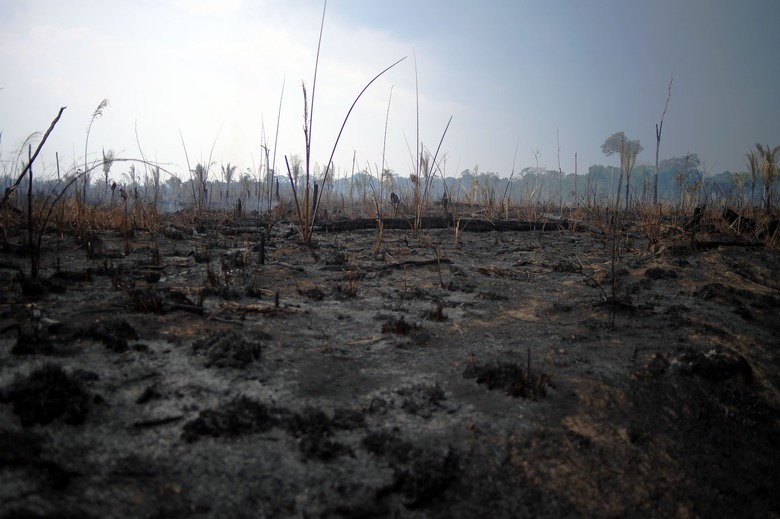The Amazon Is On Fire – And It Could Permanently Change The World
If 2019 feels like one of the most crushing years when it comes to climate change, well, it's not just in your head. While this year has some bright moments for the planet – like the Green New Deal, a comprehensive plan to address climate change – it's also been a devastating year for the planet.
And the bad may be about to get worse, because the Amazon rainforest – one of the world's most important forests – is on fire.
What's Happening With the Fire?
What's Happening With the Fire?
Before we get into the deets of the fire, a little primer: The Amazon, found mostly in Brazil but also in other Latin American countries like Peru, makes up roughly half of the planet's rainforest. It's both the largest rainforest and the one with the most biodiversity, which makes it uber-important for the planet's overall welfare.
Now, let's get to the fire. The blaze started roughly three weeks go. Even the "small" starting fire created enough smoke that it could be seen from space. And the forest burned strongly enough that strong winds carried the smoke nearly 2,000 miles away.
Satellite footage from NASA reveals that the fires in Brazil are the most active they've been since 2010.
How Do the Fires Impact Climate Change?
How Do the Fires Impact Climate Change?
Any massive forest fire has the potential to impact climate change. That's because the burning forest releases tons of carbon into the atmosphere. Those greenhouse gas emissions can contribute to climate change – then, of course, climate change also increases the chance of even more wildfires.
But the Amazon rainforest is so important to absorbing carbon and releasing oxygen that it's been called "the lungs of the planet," so wildfires in the Amazon are particularly bad.
What's especially scary is that the fires are likely linked to illegal deforestation, the Los Angeles Times reports. The Amazon is losing roughly a football field's worth of forest each minute. If we lose enough of the Amazon – and lose out on those "lungs" – the changes to Earth's atmosphere could accelerate climate change and irreversibly change our planet.
Wait, So Why Haven't You Heard More About This?
Wait, So Why Haven't You Heard More About This?
While it was devastating, the fire didn't make many headlines worldwide until last week, when activists online brought more attention to the issue – for example, under the #ActForTheAmazon hashtag on Twitter.
Since then, several world leaders have spoken out against the fires. The leaders of the G-7 met – sans President Trump, who skipped the meeting – to commit to a $20M funding package to fight the fires.
Difficult political situations in Brazil also explain why the Amazon fires aren't being treated as the emergency they are. As the Washington Post reports, Brazilian president Jair Bolsonaro has claimed his critics are setting the fires to make him look bad. And he reportedly plans to refuse foreign aid.
So What Can You Do?
So What Can You Do?
In short: speak up! Environmental activists in Brazil have stressed that global pressure can change Bolsonaro's mind regarding his response to the fires, and it could make the Brazilian government take protecting the Amazon more seriously.
So find a local climate march and get walking, or write to your representatives in government and ask them to speak out publicly to help make a difference.
References
- CNET: Amazon rainforest fires: What's happening now and how you can help
- CBS News: Parts of the Amazon rainforest are on fire — and smoke can be spotted from space
- The Hill: G-7 leaders agree on Amazon fire aid at meeting Trump missed
- NASA: NASA Satellites Confirm Amazon Rainforest Is Burning at a Record Rate
- Los Angeles Times: The Amazon rainforest is on fire. Climate scientists fear a tipping point is near
- Washington Post: The Amazon is burning. Bolsonaro says his critics are setting the fires, to make him look bad.
- GQ: The Amazon Rainforest is on Fire and Bolsonaro Refuses Foreign Aid
Cite This Article
MLA
Tremblay, Sylvie. "The Amazon Is On Fire – And It Could Permanently Change The World" sciencing.com, https://www.sciencing.com/the-amazon-is-on-fire-and-it-could-permanently-change-the-world-13721367/. 3 September 2019.
APA
Tremblay, Sylvie. (2019, September 3). The Amazon Is On Fire – And It Could Permanently Change The World. sciencing.com. Retrieved from https://www.sciencing.com/the-amazon-is-on-fire-and-it-could-permanently-change-the-world-13721367/
Chicago
Tremblay, Sylvie. The Amazon Is On Fire – And It Could Permanently Change The World last modified March 24, 2022. https://www.sciencing.com/the-amazon-is-on-fire-and-it-could-permanently-change-the-world-13721367/
